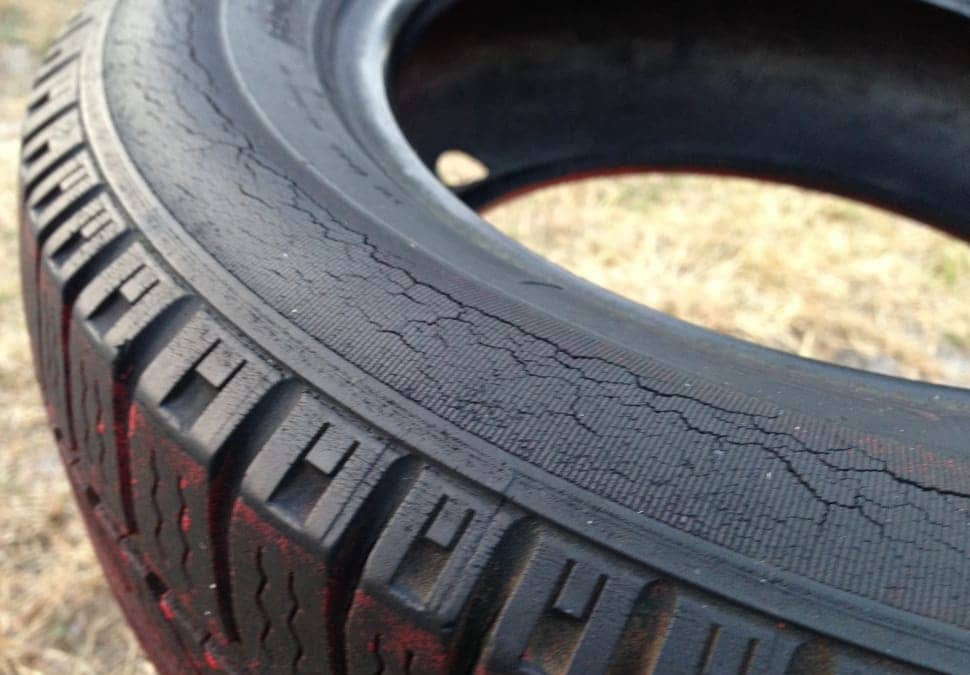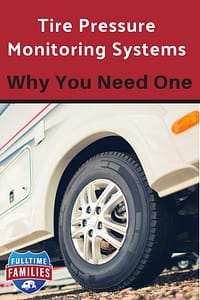This article may contain compensated links, please read our disclaimer for more information.
Most trucks and cars made in 2008 or later come equipped with a nifty little feature called a tire pressure monitoring system, or TPMS for short.
This feature is fantastic in that it keeps track of important information such as tire pressure, and notifies the driver if there seems to be a problem with the tires, giving them an opportunity to get off the road and address the issue before damage, accidents, or injury have a chance to occur.
Unfortunately, not all RVs come equipped with such an RV tire pressure monitoring system. Considering how much damage a tire blowout can do to a motorhome or travel trailer, and how dangerous it can be to lose control of such a large vehicle, this seems like a huge oversight, and one you will want to address right away.
Luckily, you can purchase and install an aftermarket RV tire pressure monitoring system. This project doesn’t have to be very expensive, and most moderately handy people will be able to get the job done all on their own.
In this article we will discuss the RV TPMS types, what to look for in an RV tire pressure monitor, and which are the best TPMS for RV motorhomes and travel trailers.

RV Tire Pressure Monitoring System Types
When it comes to TPMS for RV travel trailers and motorhomes, there are two main types. Knowing about each type will help you decide what is ideal for you and your rig.
What are these RV tire monitoring system types? We’ve explained each one in detail below.
Direct RV TPMS
Easily the more thorough and helpful of the two options, a direct tire pressure monitoring system for RV motorhomes and travel trailers comes equipped with special sensors that are installed inside the RV tires.
These sensors keep tabs on pressure levels—as well as other important aspects of tire health—and transmit this information to a control module. From there, a computer processes the information, deciding whether there are any issues with the tires. If a problem is detected, the computer sends a warning to your dashboard.
All of this is done wirelessly, and information is processed and sent incredibly quickly. Each sensor has its own serial number, meaning the system will let you know which tire has a problem, removing the need for guesswork.
The drawback of direct RV tire pressure monitoring systems? They are much more expensive than their counterparts. On top of that, these systems are more complex, and therefore more difficult to install. Still, because they provide so much incredibly accurate information so quickly, many people are willing to invest that extra money and effort.
Indirect RV TPMS
The second type of tire pressure monitor for RV is an indirect TPMS. This type of motorhome and trailer tire pressure monitoring system does not include special sensors that are used purely for measuring tire health. Instead, it uses sensors that are already installed in every vehicle to measure tire rotational speed. This data allows the system to estimate tire pressure, meaning it can alert the driver of a significant change in pressure.
Obviously, an indirect tire pressure monitoring system for travel trailers and motorhomes is not nearly as accurate as a direct TPMS might be. It also does not provide as much useful information. Still, the information it does provide is better than none at all, making this a decent choice if you’re on a tight budget and can’t afford the more expensive direct TPMS options.
RV TPMS Features
Now you know the two types of RV tire pressure monitoring systems. However, simply knowing which types you want to purchase is not enough to ensure you get the right thing. You’ll also want to know what kinds of features are available and which of those are important to you.
Below, we’ve compiled a list of the most useful and important features you might find in a travel trailer or motorhome tire pressure monitoring system. Use this information to narrow down your choices even further.
Information Provided
Obviously, any RV tire pressure monitoring system is going to provide information on tire pressure. However, if you wish your system to provide more information on things like acceleration and tire temperature, you will want to read the description before buying in order to ensure you’re getting what you want.
Readability
A display that can be read quickly and easily while driving is a must. After all, if your tires are having issues as you drive down the highway, you aren’t going to want to have to think about what the display is trying to tell you—or worse, miss the alert that something is wrong entirely.
Battery Life
An RV tire pressure monitoring system with dead batteries is completely useless. For this reason, it’s important that whatever system you buy has long battery life. Additionally, those batteries must be able to stand up to extreme weather conditions.
Quality
Driving down the road going 55 or 60 miles per hour isn’t easy on any part of a truck or RV. Add in driving down bumpy country roads and rough terrain in the backcountry, and you’re just asking for things to break.
Avoid having your TMPS break by making sure you purchase a high quality unit that can withstand the rigors of RV life.
Ease of Install
Finally, you will want to make sure the system you buy is one you can install. While many systems are pretty straightforward, others can be a bit of the tricky side. Generally speaking, RV tire pressure monitoring system reviews will help you figure out whether the system you have in mind will be easy to install.
Best RV Tire Pressure Monitoring Systems
Okay, so now you know exactly what you should be looking for in an RV tire pressure monitoring system. That said, most people don’t want to spend hours sifting through possible options. If you aren’t feeling up to the tedious shopping process, this is the place for you.
In this section, we’ve provided information on our top 3 RV TPMS. All are direct systems, and all do their job well. Go with one of these and you’re sure to be pleased.
EEZTire-TPMS6 Tire Pressure Monitoring System
We love the rechargeable lithium battery on the EEZTire-TPMS6 Tire Pressure Monitoring System. The visual and audio alarms are incredibly effective, and the monitoring and alert system is as fast as they come.
While this is the most expensive option on our list, it is also our favorite one, and we feel it’s well worth the extra money.
Bellacorp Tire Pressure Monitoring System
Looking for a moderately priced option? The Bellacorp Tire Pressure Monitoring System might be just the thing.
Tool-free installation means almost anyone can get this up and running, and anti-corrosion sensor caps help extend the life of the system. We also appreciate the backlighting that helps make the display more visible.
CACAGOO Tire Pressure Monitoring System
RVers on a budget will love the Favoto Tire Pressure Monitoring System. This is the most affordable option on our list, but is still a direct TPMS, meaning you will receive accurate and complete data, as well as a wireless setup.
In conclusion, an RV tire pressure monitoring system is an incredibly important piece of equipment that could save your rig, or even your life. Because these systems are relatively inexpensive and can be installed fairly quickly, there is absolutely no reason why everyone shouldn’t have one on their trailer or motorhome.
Why not invest in one today so you can rest easy knowing your family is as safe as possible during your RV adventures?
If you need new tires a great option could be Discount Tire. They have many locations and can even ship tires to you.
Join Fulltime Families
Fulltime Families Members get access to the best resources, community and discounts.
Fulltime Families is a participant in the Amazon Services LLC Associates Program, an affiliate advertising program designed to provide a means for sites to earn advertising fees by advertising and linking to amazon.com, amazon.co.uk, amazon.ca. Amazon and the Amazon logo are trademarks of Amazon.com, Inc. or its affiliates.



